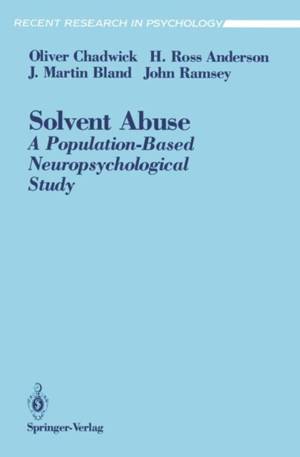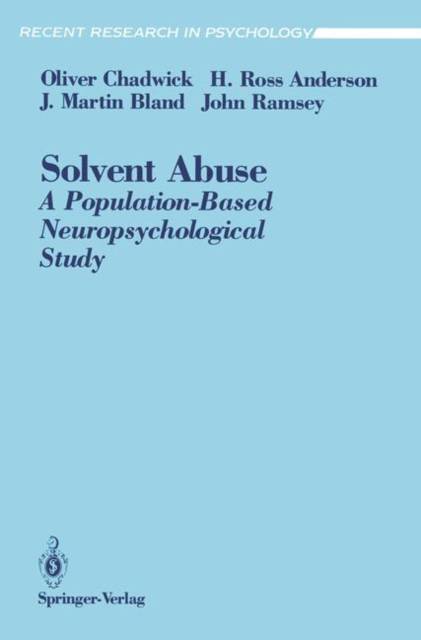
Je cadeautjes zeker op tijd in huis hebben voor de feestdagen? Kom langs in onze winkels en vind het perfecte geschenk!
- Afhalen na 1 uur in een winkel met voorraad
- Gratis thuislevering in België vanaf € 30
- Ruim aanbod met 7 miljoen producten
Je cadeautjes zeker op tijd in huis hebben voor de feestdagen? Kom langs in onze winkels en vind het perfecte geschenk!
- Afhalen na 1 uur in een winkel met voorraad
- Gratis thuislevering in België vanaf € 30
- Ruim aanbod met 7 miljoen producten
Zoeken
Solvent Abuse
A Population-Based Neuropsychological Study
Oliver Chadwick, H Ross Anderson, J Martin Bland, John Ramsey
€ 125,95
+ 251 punten
Omschrijving
1. 1 History of Solvent Abuse The practice of deliberately inhaling various gases or vapors in order to induce an altered state of mood or sensibility is not new. As noted repeatedly in other reviews (eg, Cohen, 1973; Novak, 1980), it was recognized in early Greek civilization as an adjunct to divination; indeed, it has now become customary, if not obligatory, to refer to the Oracle at Delphi before considering the more recent history of the subject. According to legend, the priestess at the Temple at Delphi would achieve communion with the Gods by inhaling the naturally-occurring gas that emanated from a fissure in a rock. Inhalation would induce a trance-like state. Her mystical observations and utterances while in this state were interpreted by the Temple Prophet and issued as divine pronouncements to those seeking guidance. Incenses, perfumes and spices have probably always been used in ceremonial worship and religious ritual. However, in sofar as it is possible to make the distinction, these substances have been used primarily for their aromatic qualities rather than for their intoxicating effects. The recreational use of gases and vapors dates from the end of the eighteenth century and may be seen as a concomitant of the scientific advances that preceded the industrial revolution. Following the synthesis of nitrous oxide by Sir Joseph Priestley in 1776, the potential uses of the gas were explored in depth by Sir Humphrey Davy.
Specificaties
Betrokkenen
- Auteur(s):
- Uitgeverij:
Inhoud
- Aantal bladzijden:
- 150
- Taal:
- Engels
- Reeks:
Eigenschappen
- Productcode (EAN):
- 9780387976075
- Verschijningsdatum:
- 22/10/1991
- Uitvoering:
- Paperback
- Formaat:
- Trade paperback (VS)
- Afmetingen:
- 156 mm x 234 mm
- Gewicht:
- 240 g

Alleen bij Standaard Boekhandel
+ 251 punten op je klantenkaart van Standaard Boekhandel
Beoordelingen
We publiceren alleen reviews die voldoen aan de voorwaarden voor reviews. Bekijk onze voorwaarden voor reviews.









